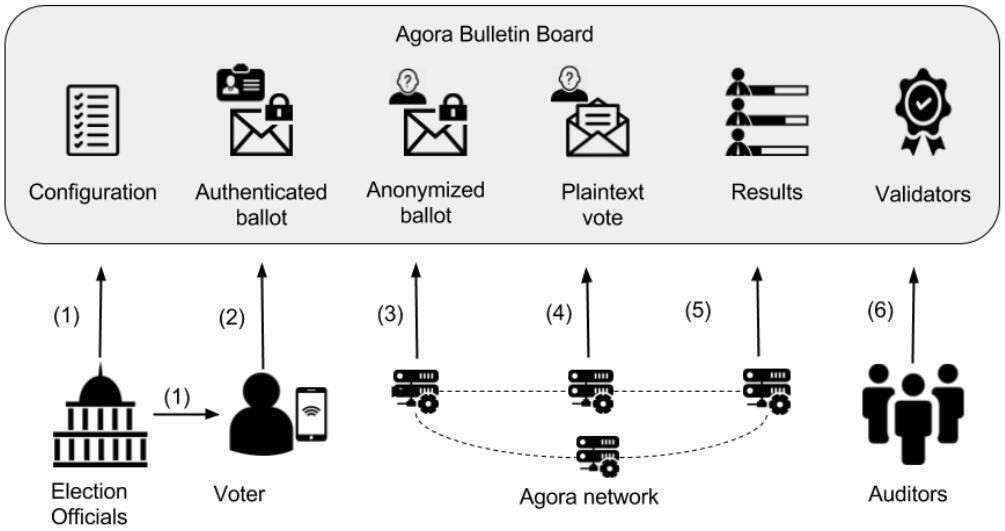Sierra Leone tests blockchain technology for tallying election results
Sierra Leone has become one of the first countries to trial the use of blockchain technology during elections. A Swiss-based company called Agora used technology similar to that underpinning the BitCoin cryptocurrency to provide a partial count of election results. Sierra Leone went to the polls on 7 March to elect a new president, members of parliament, local councillors and mayors.
Issued on:

“We recorded the votes after tallying on our blockchain where the votes are anonymised,” Leonardo Gammar, the Chief Executive Officer of Agora, told RFI. “Our observers have a look at the ballots and they send the results on our blockchain per polling station," he added.
Q&A: Leonardo Gammar
The Agora e-voting system aims to provide a decentralised system that is both transparent and verifiable, according to Gammar. Blockchain technology emerged with the creation of Bitcoin and is a digital ledger of records much like a traditional database, except that it is encrypted and stored across several computers.
“Our goal is to provide voting solutions for people, electronic voting solutions, but decentralised,” said Gammar, during a telephone interview. “In Sierra Leone, what we did is just a use case and it’s not the full implementation of our digital solution.”
Agora aims to provide a full e-voting system from voter identification to the actual casting of ballots and counting of results in the future, Gammar said.
Agora’s voting app will be linked to this implementation of blockchain technology and will provide additional features, the Agora co-founder said. One such feature would help avoid electoral fraud such as vote buying. The app would enable voters to record their choice in the election when under pressure from unscrupulous actors, but change the vote to their desired choice at a later time, as long as the poll is still open.
The test in Sierra Leone focused only on the country’s Western Area districts and was not explicitly linked to the tallying process carried out by the National Election Commission (NEC). Albert Massaquoi, a spokesperson for the NEC, confirmed that representatives from Agora were afforded observer status for the polls.
"Our idea is to start step-by-step, explaining to people the difference between a centralised e-voting system and a decentralised e-voting system," said Gammar.
Election results announced on Wednesday by the NEC gave Samura Kamara of the incumbent All Peoples Congress party 42 per cent of the vote with opposition leader Julius Maada Bio of the Sierra Leone People’s Party 43 per cent of the ballots. A second round runoff will be held on 27 March.
Agora compiled results for both Western Area Urban and Western Area Rural, publishing the results well before the official announcement by the NEC. These unofficial results did differ from the official ones.

Is the blockchain better?
The Agora system has a number of advantages, according to the Agora CEO. A decentralised solution can be more secure because it does not have a single point of failure. It would also radically reduce costs since the app, when in use, will cut down on expenditure on ballot papers, ballot boxes and electoral ink. There will also be reduced indirect costs such as providing security forces because people will be able to vote remotely and not have to line up at polling stations.
The other big advantage is the inherent trust in the system, said Gammar. As an open source solution people are free to look at the programming code that runs the blockchain. "It brings back trust from the inside, but also from the outside," said Gammar.
"IT [Information Technology] people from the election commission, from the government, from the state, can check our code, also hackers are very welcome to look at the code before the event,” he said. Furthermore, the so-called trustless nature of blockchain technology means that no one single actor can change the data, according to Agora’s white paper.
One question that may arise from such a decentralised system using blockchain is the role of the electoral commission. If Agora’s technology provides such a distributed, trustless system then is there a need for an agency overseeing elections in the traditional sense?
"We're doing this to provide a solution for the government, we're helping the government to enable their people to vote safely and remotely,” said Gammar. “We're not trying to replace the government.”
In fact, according to Gammar, Agora’s technology maintains an emphasis on the electoral commission because “we have to fit our system into their laws”. Secondly, the system itself can help deflect any criticism that might arise from election disputes over results.
"Even if the election commission is doing the job well, there will be scepticism and that scepticism can sometimes result in bad things, people can die," he said.
Technology has frequently been the subject of electoral disputes, notably during Kenya’s controversial polls last year. The country’s Supreme Court ordered a re-run of the August election following alleged hacking of the database. Before the election itself, Chris Msando, who was in charge of the computer system that would tally results, was found murdered.
Proponents of the blockchain might argue that this technology could help protect against such events. A distributed ledger, such as Agora’s, could not be effectively hacked without targeting a significant number of points on the network. While the targeting of one individual in order to access the system would not work because they would not control the entire network.
"We're really interested in helping new democracies protect their democracy," said Gammar, who is half Tunisian and spoke of his experience in watching the North African country develop following the Arab Spring uprising.
"I really think that decentralised systems can be the best way of doing this,” he said, "Sierra Leone is a first step."
Daily newsletterReceive essential international news every morning
Subscribe